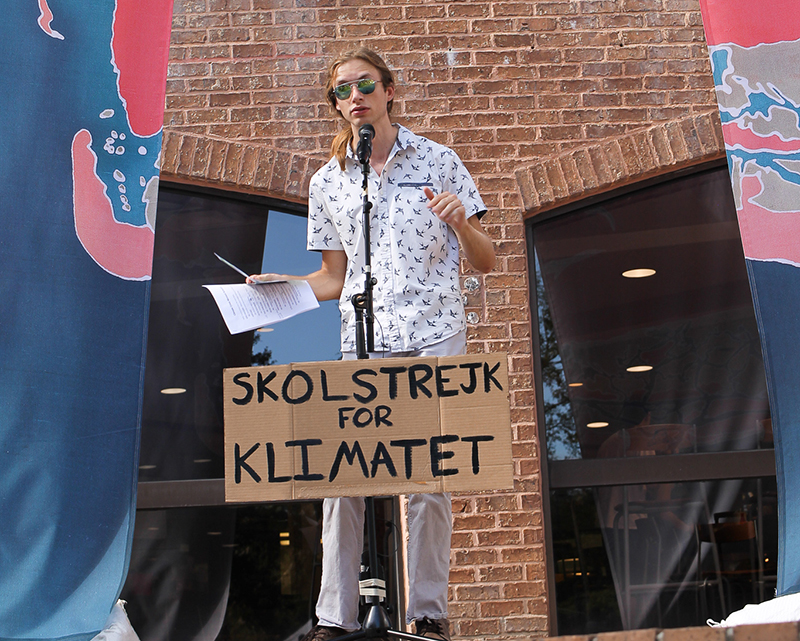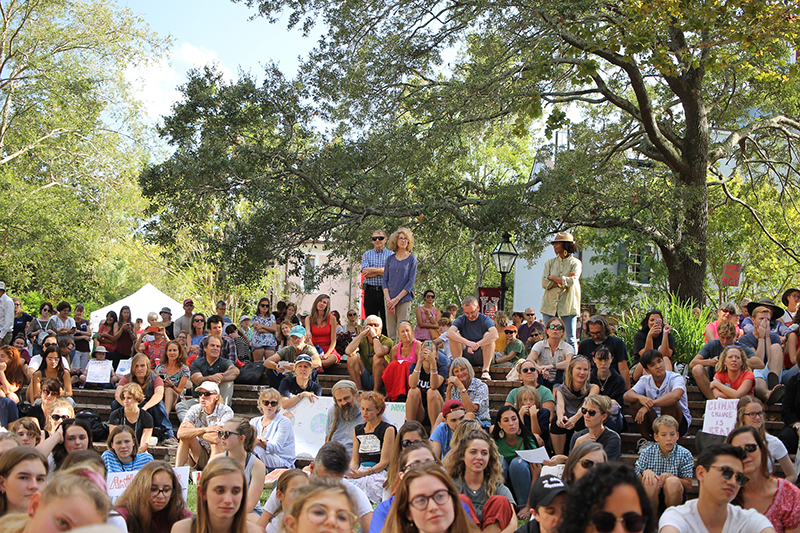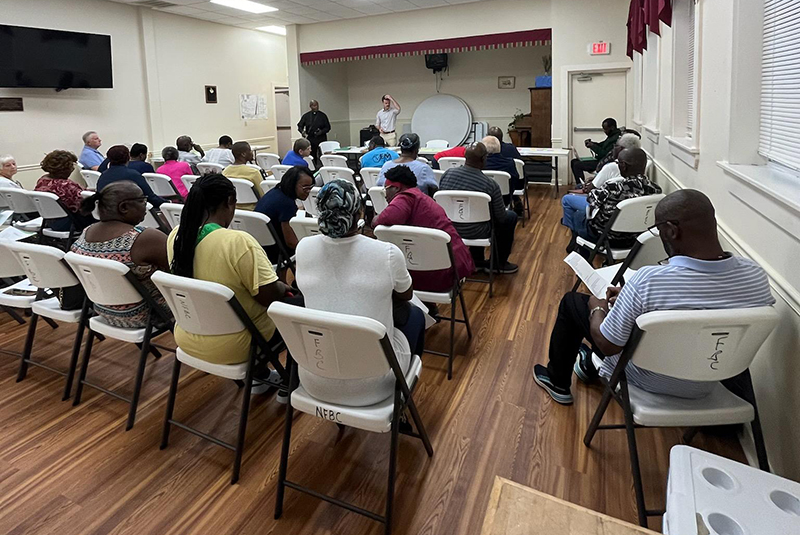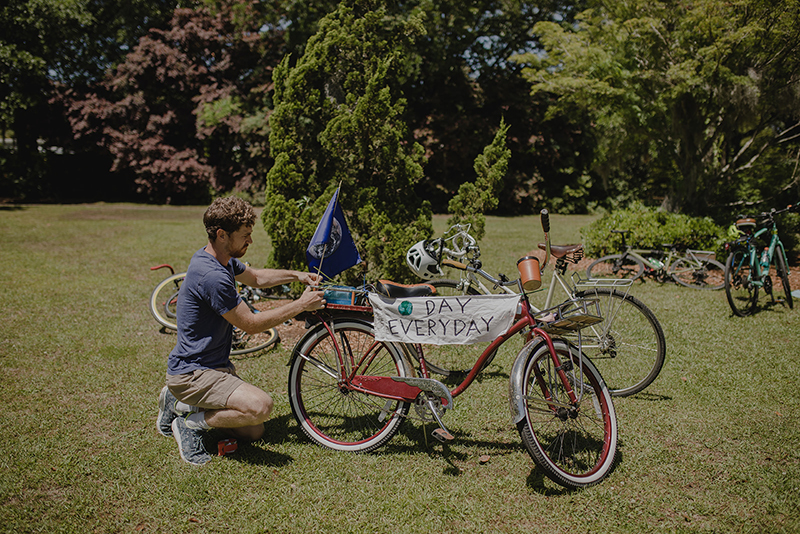Belvin Olasov is the Co-Founder and Director of the Charleston Climate Coalition and the Co-Editor-In-Chief of Surge Magazine. He believes in bringing creativity and heart to mending the climate crisis.

What prompted you to put together the Charleston Climate Coalition?
It came from a place of wanting to channel my energy into a climate activism group. I was born and raised in Charleston, South Carolina. In 2018, I went looking for a local climate activism group to join because I had come to the conclusion that climate change was the most pressing issue of our day, and I wanted to take local action. I was very surprised that I was not able to find a climate activism group in Charleston, of all places. It’s one of the most climate vulnerable cities. So I did some volunteering, met some people, and a group came together in time for the 2019 Global Climate strikes led by Greta Thunberg. We really wanted there to be a local showing for that, so we put together a rally and a week of workshops, and from there we kept the momentum going as the Charleston Climate Coalition. Our primary goal is being a vanguard for local climate action and trying to push Charleston to be a leader in the Southeast, because the southeast likes to look to itself for examples rather than to California or Colorado.

Tell us about the Coalition’s members. Who are they?
We are grassroots. That was the missing piece of the ecosphere here in Charleston. There are some wonderful, longstanding ecological nonprofits that were working in Charleston for a long time, like the Coastal Conservation League, but they tend to be a bit more grass tops. We wanted to be that activist vanguard helping mobilize folks to show up. We also work thoroughly in coalition with as many different groups as we can. There are all sorts of great nonprofits and activism groups in the environmental and justice spaces here in Charleston. We try to bring all of those groups together to make change. So we sort of have this base of everyday grassroots citizens, and then work as closely as possible with a bunch of allies.

In this post-election period, a lot of people may be refocusing on local action. I understand that the Charleston Climate Coalition played a major role in getting Charleston County to pass a resolution to develop a climate action plan—one that is centered on equity and community. Can you tell me a little bit about the Coalition’s role in making that happen?
One of our first actions as a coalition was to try to get climate emergency resolutions passed in local municipalities because we thought the first step towards addressing a problem is recognizing you have one. That work took us to the County, where our proposal for a climate emergency resolution turned into a climate action resolution that included a commitment to putting together an equitable, community-centered climate action plan.

From that resolution, the County hired some consultants who had put together a lot of really great plans across the North American continent, and they put together a really strong plan. We consulted on it. Once the plan was together, it was a heck of a time actually getting the thing passed. There was a sort of predatory delay tactic where they kept pushing it back month after month from the agenda for going up for a vote—so much so that eventually the sustainability director, the person who put it together on the County side, left. But we kept up the pressure. That’s all you can do as an advocacy organization. We kept people emailing, calling, and showing up to council meetings. We kept people abreast and provided updates. I felt embarrassed because multiple times I said, “Okay, this is the month. It’s going to show up on the agenda.” And then it was not on the agenda. But eventually it was, and it was passed. We just made it very clear that this was not something that was going to go away and that people were actually paying attention. That’s crucial sometimes because the difference between what happens when people are and aren’t paying attention is massive, in my experience.
Congratulations on that work. What is the status of that plan now?
It is actually a very strong plan, with 53 different action items—some very aspirational pieces and some very functional pieces. But a plan is only as good as its execution, so our continuing work is making sure that it is carried out. Right now, we’re doing some work with partners, and soon the community, to identify our collective priorities out these 53 action items because they’re not going to do all of them at once. Helping to create some political pressure in the right points is our plan moving forward.
The Coalition’s website shares something called Charleston 2030. a model framework for Lowcountry municipalities to use when considering infrastructure updates to adapt to climate change. Are you seeing the results of your work ripple outward throughout and perhaps beyond Lowcountry?
That has actually been a theme of my last few months: being surprised and a little delighted at the ways in which the work we’ve done echoes out because you feel very focused on what’s in front of you. We had this King Street Bike Lane campaign, where we’re trying to fight for a protected bike lane on one of the famous central roads of downtown Charleston, King Street. That ended up in a stalemate because a new mayor came in and the idea has been put on ice. But in the past couple of weeks, I’ve talked with students at College of Charleston who are continuing to talk with the College about support on King Street Bike Lane. I’ve also talked with other folks who are interested in putting King Street Bike Lane call to action on the back of their bike taxis. It’s all planting seeds. That’s all this work is.

One of my growth areas as an activist has been around the importance of raising up other leaders who are doing this work. I heard an anecdote of an organizer who was talking with his mentor and his mentor told him, “I don’t care how glamorous your event is, I don’t care how smoothly it went. What I care about is if, in the process of planning it, two or three people stepped up and helped make it happen. That makes it a great event.” That reframing of the work we do has really been on my mind. Accomplishments are very important. We’re results oriented as climate activists because we’re dealing with greenhouse gases, this numerical game, but I think you also have to be very aware of the organic human seeds you’re spreading because that’s the actual revolution in action.
Your background is in creative writing. You’re a storyteller. The Coalition was co-founded by Dr. Jen Wright, a professor of psychology. How have your combined backgrounds helped you advance the work of this coalition and nurture its community?
Jen came in initially for our week of workshops after that first rally, and she did a workshop on sacred activism—the deeper roots behind the action. It’s grounding yourself in the psychological concepts of “Where is ego coming into this work?” and growing yourself in the spiritual concepts of “What is the collective spirit I’m tapping into as I do this work?” It’s a way of thinking about activism as something that’s very nourishing, empowering, and clarifying. It is deeply appealing to me as someone who is interested in hero narratives and the ways in which these stories can propel us, and the ways we can enjoy this work more through these overlapping narratives. That is built into the Coalition’s DNA.
I certainly weave my stuff as a creative as much as possible into our work. We have a magazine we put out called Surge. That was an attempt to marry my interests and my love of journalism with local climate activism. The original inspiration for Surge was these old school, revolutionary zines during the ’60s and early ’70s. We’ve played around with the format, but that original inspiration was something that’s sort of “fight-the-power-esque” and experimental in its design. We’ve included comedy, music, comics, and arts. I think activism has to feel like a living thing, and that requires infusing it and filling it with human things like art and community. Personally, a way in which I continue to enjoy this work is finding ways to experience it narratively. We fought against a gas plant this year and I felt like a Green Knight or a Merry Prankster. That makes it feel like a richer experience, and it really helps me keep going.
I think if you were to ask people what emotion comes to mind when they hear the word “activism,” they might immediately think of anger or rage. I get the sense that joy is woven into much of the Coalition’s work. Can you talk about the role of joy in your work?
That was one of our founding principles: this has to be joyful and creative. That was partially intuition about how you get people involved with something. People have busy lives. They may want to jump in, but there are all sorts of factors by which they don’t—they’re tired, they’ve had a long day. So, there’s a very basic aspect of “this has to be fun.”

I also think that there is revolution in it being fun. Take utilities, for example. If you had to assign utilities a color, it’d be gray. They are governed by convoluted and arcane systems. There are a lot of intricacies and moneyed interest. But utilities are one of the most important power structures to get involved with as an activist dealing with climate. They’re controlling so much of the flow of power and energy. We’re planning a campaign that’s challenging our local utility, Dominion, and right now I’m brainstorming ways in which we can carry that out in the spirit of Abbie Hoffman. Hoffman, one of the Chicago seven, brought real playfulness, silliness, and theatrics to activism. An example that really sticks with me is his attempt to end the war in Vietnam by exorcizing the Pentagon—surrounding it with 7,000 hippies and having them hold hands and attempt to levitate it. With that framing, he got thousands of people to march against the war in Washington. I think there’s a lot of room for a resurgence or reformulation of that ’60s counterculture, anti-war activism energy, and that’s what I’m really interested in playing with right now. We’re planning on bringing some of that energy against Dominion in the new year.
In addition to people having busy lives and needing to make something appealing so that they will come, there’s also the enormity of the problem and the paralysis that can come with that. Do you want to speak to that at all?
That is part of the reason why we center joy. We are wading deep into these dark and muddy waters of the climate crisis. It’s a little easier initially to look away, disengage, or avoid. If we are going to confront what is a dark reality, with a great deal of climate chaos baked in, that’s going to take a whole bunch of effort, and we have to be holding a light along the way.
Your work may be joyful, but it certainly is not easy. I imagine it can become even harder when elections result in leadership changes. What gives you the hope and determination to continue doing what you’re doing?
The day after the [U.S. presidential] election, as any climate activist would, I was like, “What? Did we just lose? What does this mean?” It’s hard to wrap your head around. It’s going to be a bumpy four years, for sure. But one way I like to think about the climate crisis is that it is this great collective call to action. There’s a way of thinking about all of this thermal energy that’s coming in year to year, as this different age. It’s a solar age, and that brings with it chaos and loss, but also brings with it a call to be connected; a call to be an actor and not a participant; a call to adventure; a call to reform systems that in many ways have not been working in the first place.
That’s another central theme across the Charleston Climate Coalition: centering equity. We’re being called on to rethink so many of our systems and the deep fault lines of inequity running through so many of them. We have to do this work if we care about our fellow human beings.

Hope is an action. I tell people the greatest climate anxiety salve is knowing you’re doing the most you can, and that actually does really help move things through.
Ecological restoration actually gives me a tremendous amount of hope. I saw a news story about salmon returning to a restored river that was under new stewardship, and I started tearing up. I think there’s a deep collective pain of the loss of all of this land. The success stories show us that if we give nature a chance, it really takes it. That feels really empowering. We’re working with a local group, the Marsh Project, who have this ecological corridor project trying to weave ecology—native plant gardens, bioswales, tree cover, etc.—into a swath of downtown Charleston. That’s some of the most fun, exciting work we have in front of us because it’s a better way to live. Being woven into ecology, thinking of our pollinator friends as family as we are building out our built environment, that’s resilient. It’s human friendly. That gives me excitement and hope.
There’s a part of me that doesn’t need hope, because the climate crisis is not a binary “we fix it; we don’t fix it” thing. It’s the points of degrees of warming that have very dire human consequences. There’s this broad spectrum, and each notch we bring it down is less suffering and loss. We just keep doing the work to notch it down, even if things feel hard, even if it feels like we’ve lost federal ground or things are moving slower than we’d like (which they always are). There’s a Nelson Mandela quote, “it always seems impossible until it’s done.” You just don’t know the future. Anything could happen. Revolutions can happen. Cultural changes can happen. Spiritual movements can happen. Federal shifts can happen. There’s so much that’s unwritten.
What advice do you have for people who may be looking, as you once were, for a local group to join that is taking climate action, but such a group may not exist where they live? Any words of advice on making and finding community?
You can start small. In fact, small groups of people acting is how change starts. Don’t worry about matching another organization; worry about having a little group of people who are sharing how they feel, figuring out one action, and then maybe getting involved with another group that’s also interested in that action. It’s all just doing things. You don’t have to know what you’re doing. You’ll swiftly learn by doing. Move from consideration to action and then everything else will flow from there.
Do you have any final words of encouragement?
I think the folks doing this ecological restoration work are doing… literally the most important work on the planet. Many people who are working in this sphere have a science background and are approaching things from that mindset. I have a sort of ecological spirituality that I work with. I feel like the earth has a spirit, and I’m sure that as folks who are in nature, they’re interfacing with that spirit in their own way. I encourage you to think that you’re in a relationship with the earth, and that the earth is tremendously grateful for the work you’re doing.
